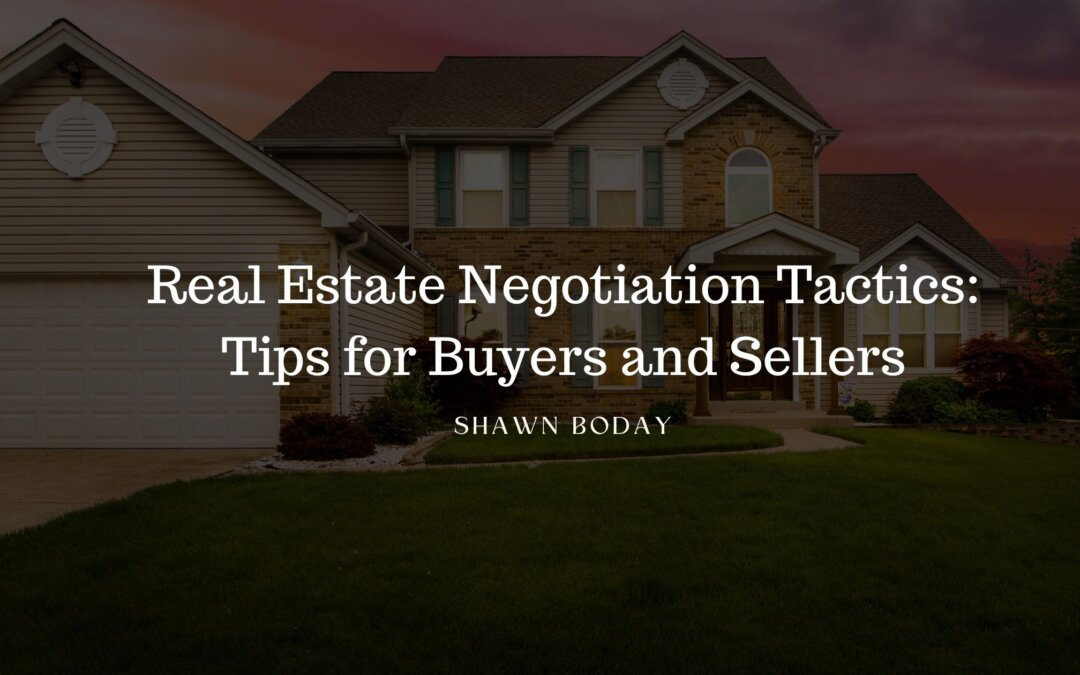
by Shawn Boday | Apr 25, 2024 | Home Buying Process, House Flipping, Housing Market, Real Estate, Real Estate Investing, Real Estate Tips, Real Estate Value, Shawn Boday, Uncategorized
Renovating a home can be an exciting project, whether planning to enhance your living space or preparing to sell your property. When renovating for resale, you must make strategic decisions to increase your home’s value and attract potential buyers. In this blog post, we’ll explore some valuable tips for renovating your home with resale in mind.
1. Know Your Market
Before embarking on any renovation project, it’s crucial to research the local real estate market and understand the preferences and expectations of potential buyers in your area. Take note of the features and amenities in high demand and are likely to fetch a higher sale price. For example, buyers may prioritize updated kitchens and bathrooms in some markets, while in others, outdoor living spaces or energy-efficient upgrades may be more desirable.
2. Focus on High-Return Projects
When renovating for resale, it’s important to prioritize projects that offer a high return on investment (ROI). According to Remodeling magazine’s annual Cost vs. Value report, some of the renovations with the highest ROI include kitchen remodels, bathroom upgrades, and adding a deck or patio. These projects not only enhance the aesthetic appeal of your home but also provide tangible value that can increase its resale value.
3. Enhance Curb Appeal
First impressions matter, especially when selling a home. Improving your home’s curb appeal can significantly attract potential buyers and set the stage for a positive viewing experience. Consider simple yet effective upgrades such as painting the exterior, replacing the front door, updating landscaping, and adding outdoor lighting. These improvements can make your home more inviting and memorable to prospective buyers.
4. Update Kitchen and Bathrooms
Kitchens and bathrooms are often the focal points of a home and can significantly influence a buyer’s decision. Consider updating these spaces with modern fixtures, appliances, and finishes to create a more functional and visually appealing environment. Focus on timeless design elements and quality materials that will appeal to many buyers and stand the test of time.
5. Increase Energy Efficiency
Energy-efficient upgrades reduce utility costs for homeowners and appeal to environmentally-conscious buyers looking for sustainable features in a home. Consider investing in energy-efficient appliances, windows, insulation, and HVAC systems to improve your home’s energy performance and attract eco-minded buyers. Highlighting these upgrades can also differentiate your property from others on the market and increase its overall value.
6. Optimize Storage Space
Buyers are always looking for ample storage space, so maximizing storage opportunities throughout your home can make a big difference in its appeal. Consider adding shelving, closet organizers, or storage solutions such as under-stairs or built-in cabinets. These additions can help buyers visualize themselves living in the space and make your home feel more organized and functional.
7. Keep It Neutral and Timeless
When renovating for resale, it’s essential to appeal to a broad audience by choosing neutral and timeless design elements. Avoid overly trendy or niche features that may appeal to only a subset of buyers and could potentially turn off others. Opt for neutral paint colors, classic finishes, and versatile design choices that will stand the test of time and appeal to a wide range of tastes and preferences.
Conclusion
Renovating a resale home requires careful planning, strategic decision-making, and focusing on projects that maximize value and appeal to potential buyers. By knowing your market, prioritizing high-ROI projects, enhancing curb appeal, updating key areas like kitchens and bathrooms, increasing energy efficiency, optimizing storage space, and keeping design choices neutral and timeless, you can increase your home’s resale value and attract more interested buyers. With thoughtful renovation choices and attention to detail, you can set your home apart from the competition and achieve a successful sale at a higher price point.

by Shawn Boday | Apr 25, 2024 | Business, Home Buying Process, House Flipping, Housing Market, Real Estate, Real Estate Investing, Real Estate Tips, Real Estate Value, Shawn Boday
As the population ages, seniors play an increasingly significant role in shaping the real estate market. With changing preferences, needs, and lifestyles, this demographic drives demand for specific housing and amenities. This blog post will explore how seniors influence the housing market and what this means for real estate trends.
Rise in Demand for Senior-Friendly Housing
One of the most significant impacts of the aging population on the real estate market is the growing demand for senior-friendly housing options. As individuals age, they often seek homes that are more accessible, easier to maintain, and better suited to their changing needs.
Many seniors are downsizing from larger homes to smaller, more manageable properties like condos, townhouses, or single-level dwellings. These housing options typically require less maintenance and offer amenities such as community centers, fitness facilities, and on-site healthcare services, which appeal to seniors looking to simplify their lives and enjoy an active lifestyle.
Age-Friendly Features and Amenities
In addition to downsizing, seniors seek homes with age-friendly features and amenities that promote safety, comfort, and independence. Features such as grab bars in bathrooms, wider doorways and hallways, step-free entrances, and low-maintenance landscaping are becoming increasingly popular among older homeowners.
Senior living communities and retirement villages are also gaining popularity. These communities offer a range of amenities and services tailored to the needs of older adults. These communities often include on-site healthcare facilities, recreational activities, social events, and transportation services, providing residents with a supportive and vibrant environment to age gracefully.
Impact on Housing Inventory and Affordability
The growing demand for senior-friendly housing options affects housing inventory and affordability in many markets. As more seniors choose to age in place or downsize to smaller homes, there is increased competition for these properties, leading to higher prices and reduced availability, particularly in desirable retirement destinations.
Additionally, the influx of retirees into certain areas can pressure local housing markets, driving up prices and making it more challenging for younger generations to afford homeownership. This can exacerbate affordability issues, especially in areas with limited housing supply and high demand.
Opportunities for Real Estate Investors
The aging population also presents opportunities for real estate investors who are savvy enough to recognize and capitalize on emerging trends. Investing in senior-friendly housing options, such as multifamily properties, assisted living facilities, or senior living communities, can offer attractive returns and steady rental income, particularly in markets with a large and growing senior population.
Moreover, retrofitting existing properties to include age-friendly features and amenities can add value and appeal to older homeowners looking to age in place or downsize. Investing in renovations and upgrades that cater to the needs of seniors can make properties more attractive to this demographic and increase their marketability and resale value.
Conclusion
The aging population is profoundly impacting the real estate market, driving demand for senior-friendly housing options and amenities. As more seniors seek homes that are accessible, comfortable, and supportive of their changing needs, the housing market will continue to evolve to accommodate these preferences. For real estate professionals, investors, and developers, understanding and adapting to the needs of the aging population presents significant opportunities for growth and innovation in the years to come.

by Shawn Boday | Feb 29, 2024 | Real Estate, Shawn Boday
Real estate flipping, also known as house flipping, is a popular investment strategy in which investors purchase properties, renovate them, and then sell them for a profit. While flipping houses can be a lucrative venture, it requires careful planning, research, and execution to succeed. In this blog post, we’ll explore the ins and outs of real estate flipping, including how to find properties, finance renovations, and maximize profits.
- Finding the Right Property: The first step in real estate flipping is finding the right property to flip. Look for properties in desirable neighborhoods with strong market demand and potential for appreciation. Consider factors such as location, property condition, and price relative to comparable sales in the area. Utilize online listing platforms, real estate agents, and networking to identify potential investment opportunities.
- Conducting Due Diligence: Before purchasing a property, conduct thorough due diligence to assess its investment potential. Evaluate the property’s condition, structural integrity, and repair needs. Obtain professional inspections and estimates for renovation costs to ensure accuracy in your financial projections. Additionally, research local market trends, comparable sales, and property values to determine the property’s resale value and potential profit margin.
- Securing Financing: Financing is a critical aspect of real estate flipping, as it enables investors to fund property acquisitions and renovations. Explore financing options such as traditional mortgages, hard money loans, private lenders, or partnerships with other investors. Consider factors such as interest rates, loan terms, and repayment schedules to choose the financing option that best suits your needs and investment strategy.
- Renovating for Maximum ROI: Once you’ve acquired the property, it’s time to renovate and upgrade it to maximize its resale value. Focus on high-impact improvements that enhance the property’s appeal and functionality, such as kitchen and bathroom upgrades, flooring replacements, and cosmetic enhancements. Set a realistic budget and timeline for renovations, and prioritize projects that offer the highest return on investment (ROI) within your budget constraints.
- Marketing and Selling: After completing renovations, it’s time to market the property and attract potential buyers. Utilize professional photography, virtual tours, and staging to showcase the property in its best light. Develop a comprehensive marketing strategy that includes online listings, open houses, and targeted advertising to reach a wide audience of prospective buyers. Work with a real estate agent or broker to navigate the sales process and negotiate offers to maximize your profit.
- Calculating Profit and ROI: Calculate your profit and return on investment (ROI) by subtracting the total acquisition and renovation costs from the final sale price of the property. Factor in additional expenses such as financing costs, closing costs, and holding costs to determine your net profit. Evaluate your ROI to assess the success of the flip and identify areas for improvement in future projects.
- Managing Risks and Challenges:
Real estate flipping comes with inherent risks and challenges, including market fluctuations, renovation delays, and unexpected expenses. Mitigate risks by conducting thorough due diligence, securing adequate financing, and maintaining a contingency fund for unforeseen costs. Stay informed about local market trends and economic conditions to adapt your strategy and minimize potential risks.
Real estate flipping offers investors the opportunity to profitably buy, renovate, and sell properties in dynamic real estate markets. By following the steps outlined in this guide, investors can successfully navigate the real estate flipping process and achieve their financial goals. Remember to conduct thorough due diligence, carefully plan renovations, and market the property effectively to maximize profits and minimize risks. With diligence, patience, and strategic planning, real estate flipping can be a rewarding and profitable investment venture.

by Shawn Boday | Feb 9, 2024 | Housing Market, Real Estate, Real Estate Investing, Real Estate Tips, Real Estate Value, Shawn Boday
Real estate negotiation is a critical aspect of buying or selling a property, requiring skill, strategy, and finesse to achieve favorable outcomes for all parties involved. Whether you’re a buyer looking to secure your dream home or a seller aiming to maximize your property’s value, understanding effective negotiation tactics can make all the difference in closing a successful deal. In this article, we’ll explore essential negotiation tips and strategies for both buyers and sellers in the real estate market.
- Do Your Research: Knowledge is power in real estate negotiation, so start by conducting thorough research on the local market trends, comparable properties, and recent sales in the area. As a buyer, understanding the market conditions and property values will help you make informed offers and negotiate from a position of strength. Sellers should similarly research comparable listings and recent sales to determine an appropriate listing price and anticipate potential buyer objections.
- Set Clear Objectives and Priorities: Before entering into negotiations, establish clear objectives and priorities for the transaction. Buyers should determine their desired purchase price, desired closing timeline, and any specific terms or conditions they are seeking. Sellers should likewise identify their minimum acceptable sale price, preferred closing date, and any concessions or contingencies they are willing to accommodate. Having clear objectives will guide your negotiation strategy and help you stay focused during the process.
- Build Rapport and Establish Trust: Successful negotiation often hinges on building rapport and establishing trust with the other party. Whether you’re a buyer or a seller, take the time to connect with the other party on a personal level and demonstrate your sincerity and integrity. Listen actively to their concerns and priorities, and seek common ground wherever possible. Building a positive relationship can create goodwill and facilitate more productive negotiations.
- Use Timing to Your Advantage: Timing can be a powerful negotiating tool in real estate transactions. As a buyer, consider making an offer when the market is slow or during the off-peak season when sellers may be more motivated to negotiate. Sellers may benefit from strategically timing their listing to coincide with high demand periods or when inventory is low. Additionally, be mindful of key deadlines and contingencies in the negotiation process, and use them to your advantage when negotiating terms.
- Be Prepared to Compromise: Negotiation is inherently a give-and-take process, so be prepared to compromise on certain aspects of the deal to reach a mutually acceptable agreement. Identify your non-negotiables and areas where you’re willing to be flexible or make concessions. Buyers may need to adjust their offer price or terms based on seller feedback, while sellers may need to accommodate buyer requests for repairs or concessions to close the deal. Finding common ground and reaching a compromise is essential for moving the negotiation forward.
- Stay Calm and Maintain Perspective: Negotiation can be stressful and emotionally charged, but it’s essential to stay calm, composed, and focused throughout the process. Avoid becoming overly emotional or attached to specific outcomes, and instead, maintain a positive attitude and a long-term perspective. Keep the lines of communication open, be patient and persistent, and trust in the negotiation process to ultimately lead to a successful outcome.
Mastering real estate negotiation requires preparation, strategy, and effective communication skills. Whether you’re a buyer or a seller, understanding the nuances of negotiation and implementing proven tactics can help you achieve your objectives and secure a favorable outcome in the real estate transaction. By conducting research, setting clear objectives, building rapport, using timing to your advantage, being prepared to compromise, and maintaining a calm and focused demeanor, you can navigate the negotiation process with confidence and achieve success in the competitive real estate market.

by Shawn Boday | Feb 9, 2024 | Real Estate, Real Estate Investing, Real Estate Tips, Shawn Boday
The real estate market is constantly evolving, influenced by various factors such as economic conditions, demographic shifts, technological advancements, and changing consumer preferences. As we look ahead to 2024, it’s essential for buyers, sellers, investors, and industry professionals to stay informed about the latest trends shaping the real estate landscape. In this article, we’ll explore some of the key trends to be aware of in 2024 and their potential impact on the market.
- Continued Demand for Affordable Housing: Affordable housing remains a pressing issue in many markets, driven by factors such as population growth, urbanization, and income inequality. In 2024, we can expect to see continued demand for affordable housing options, particularly in urban centers and high-cost areas. Developers and policymakers will need to explore innovative solutions such as mixed-income housing developments, accessory dwelling units (ADUs), and micro-housing to address this growing need and ensure housing affordability for all segments of the population.
- Rise of Remote Work and Flexible Living Spaces: The COVID-19 pandemic has accelerated the adoption of remote work and flexible work arrangements, prompting many individuals and families to reassess their housing preferences. In 2024, we can anticipate a continued shift towards remote work and a greater emphasis on flexible living spaces that accommodate both work and leisure activities. Homebuyers may prioritize features such as dedicated home offices, outdoor workspaces, and multipurpose rooms that offer versatility and adaptability to changing lifestyle needs.
- Sustainable and Eco-Friendly Developments: As awareness of environmental issues grows and concerns about climate change mount, there is increasing demand for sustainable and eco-friendly real estate developments. In 2024, we can expect to see a rise in green building practices, energy-efficient design features, and eco-friendly amenities in both residential and commercial properties. Developers and builders will need to prioritize sustainability initiatives such as LEED certification, passive design principles, and renewable energy integration to meet the demand for environmentally conscious real estate options.
- Emphasis on Health and Wellness Amenities: The COVID-19 pandemic has underscored the importance of health and wellness in our daily lives, influencing consumer preferences for real estate amenities. In 2024, we can anticipate a greater emphasis on health and wellness amenities in residential and commercial properties, including fitness centers, outdoor recreation spaces, and access to nature trails and green spaces. Properties that prioritize health and wellness features are likely to appeal to buyers and tenants seeking to prioritize their physical and mental well-being.
- Technology Integration and Smart Home Features: Advancements in technology continue to transform the real estate industry, with smart home features and digital innovations becoming increasingly prevalent in properties of all types. In 2024, we can expect to see continued integration of technology into real estate developments, including smart home automation systems, energy management tools, and IoT (Internet of Things) devices. Homebuyers and tenants will prioritize properties with advanced technology features that enhance convenience, efficiency, and connectivity in their daily lives.
- Shifts in Urban and Suburban Living Preferences: The COVID-19 pandemic has prompted many individuals and families to reconsider their living preferences, with some opting for suburban or rural locations over dense urban centers. In 2024, we can anticipate continued shifts in urban and suburban living preferences, driven by factors such as affordability, space, and access to amenities. Suburban areas with proximity to urban centers and suburban amenities are likely to see increased demand, while urban areas may experience slower growth or repositioning to attract residents.
As we navigate the ever-changing real estate landscape in 2024, it’s essential for stakeholders to stay informed about the latest trends and developments shaping the market. From affordable housing initiatives and flexible living spaces to sustainable developments and smart home technology, the real estate industry is evolving to meet the evolving needs and preferences of buyers, sellers, investors, and tenants. By staying ahead of the curve and embracing innovation, stakeholders can capitalize on emerging opportunities and navigate the dynamic real estate market with confidence and success.

by Shawn Boday | Dec 28, 2023 | Housing Market, Real Estate, Real Estate Investing, Shawn Boday
The pulse of the global real estate market is beating with significant shifts, creating both challenges and opportunities for investors worldwide. In the United States, the landscape has seen a notable dip in transaction volumes amid a substantial rise in interest rates, leading to a gap in prices between buyers and sellers. The doubling of the risk-free rate has left the transaction pipeline about 60% below the recent average.
However, this scenario has not spelled doom for the real estate sector. Despite the shockwaves, there are silver linings. The higher rates have spurred stability, with U.S. Treasuries hovering around 4%, aligning more closely with the long-term average. Interestingly, the rise in rates has led to a cooling effect on the cost of materials and labor, fostering a positive environment for development and redevelopment activities.
Turning our gaze to Europe, the market has experienced a slump in property transaction volumes in 2023, attributed to the rate shock. Yet, there is optimism for a revival in 2024, as the specter of returning to 2021 rate levels diminishes. European real estate valuations have adjusted swiftly, particularly in the aftermath of geopolitical tensions, with a nearly 15% decline.
In Australia, a slower adjustment of valuations is noted, and the market is in the throes of a downward shift, likely to continue in the next six months. The resilience of investors to sell below book value is creating a scenario where falling valuations may exert pressure on debt covenants, stimulating more transaction activity and narrowing the gap between buyers and sellers.
In the United States, a similar scenario is envisaged, with expectations of further corrections in valuations. However, a noteworthy point is the anticipated greater differentiation in outcomes, creating a ‘stock picker’s market’ where the quality of assets and the expertise of the team play pivotal roles in performance.
The real estate debt market is emerging as a favorable avenue, particularly in the U.S. and Europe. Traditional lenders have scaled back, providing opportunities for non-traditional lenders to fill the void. The combination of a dearth of capital and increased base rates has enhanced the risk-return profile for real estate debt, especially in areas like construction lending.
On the equity front, challenges persist in the higher-rate environment, but strategic opportunities abound. In Australia, a focus on residential assets supported by structural themes appears promising. In the U.S., the theme of housing affordability is taking center stage, with a rising population of renters creating opportunities in various residential sectors.
Despite the opportunities, risks loom on the horizon. Inflated costs, particularly in development activities, present a significant challenge. Refinancing risks, geopolitical uncertainties, and the specter of legislative changes add further layers of complexity.
As we navigate the global real estate terrain, it is crucial to stay attuned to these shifts and leverage the emerging opportunities. The coming years hold the promise of compelling investment prospects, underlining the resilience and adaptability of the real estate market on an international scale.






